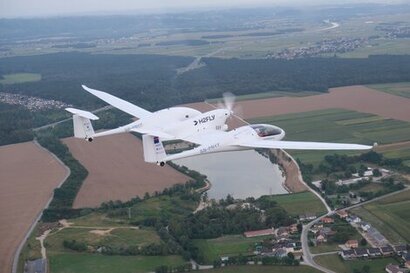
The H2FLY team has completed four flights powered by liquid hydrogen as part of its flight test campaign, including one flight that lasted for over three hours. The flights were completed with H2FLY’s piloted HY4 demonstrator aircraft, fitted with a hydrogen-electric fuel cell propulsion system and cryogenically stored liquid hydrogen that powered the aircraft.
Results of the test flights indicate that using liquid hydrogen in place of gaseous hydrogen will double the maximum range of the HY4 aircraft from 750 km to 1,500 km, marking a critical step towards the delivery of emissions-free, medium- and long-haul commercial flights.
“This achievement marks a watershed moment in the use of hydrogen to power aircraft” said Professor Josef Kallo, co-founder of H2FLY. “Together with our partners, we have demonstrated the viability of liquid hydrogen to support medium and long-range emissions-free flight. We are now looking ahead to scaling up our technology for regional aircraft and other applications, beginning the critical mission of decarbonising commercial aviation.”
The successful campaign marks a significant milestone for H2FLY, reflecting the extensive insights from the company’s research efforts. Moreover, it is the culmination of Project HEAVEN, a European-government-supported consortium assembled to demonstrate the feasibility of using liquid, cryogenic hydrogen in aircraft. The consortium is led by H2FLY and includes the partners Air Liquide, Pipistrel Vertical Solutions, the German Aerospace Center (DLR), EKPO Fuel Cell Technologies, and Fundación Ayesa.
Beside project HEAVEN, the work has been funded by the German Federal Ministry for Economic Affairs and Climate Action (BMWK), the German Federal Ministry for Digital and Transport (BMVD), and The University of Ulm.
Compared with pressurised gaseous hydrogen storage (GH2), the use of liquified, cryogenic hydrogen (LH2) enables significantly lower tank weights and volume, therefore leading to increased aircraft range and useful payload.
With the completion of the flight testing in project HEAVEN, H2FLY will focus on the path to commercialisation. In June, H2FLY announced the development of its new H2F-175 fuel cell systems which will be capable of providing their full power range in flight altitudes of up to 27,000 ft, marking an important step on the path from lower altitude viability flight demonstrations to real-world commercial aircraft applications.
In 2024, H2FLY will open its Hydrogen Aviation Centre at Stuttgart Airport, co-funded by the Ministry of Transport Baden Württemberg. The Centre will become a focal point for the future of Europe’s aviation industry and its hydrogen economy, providing fuel cell aircraft integration facilities and liquid hydrogen infrastructure.
For additional information:

